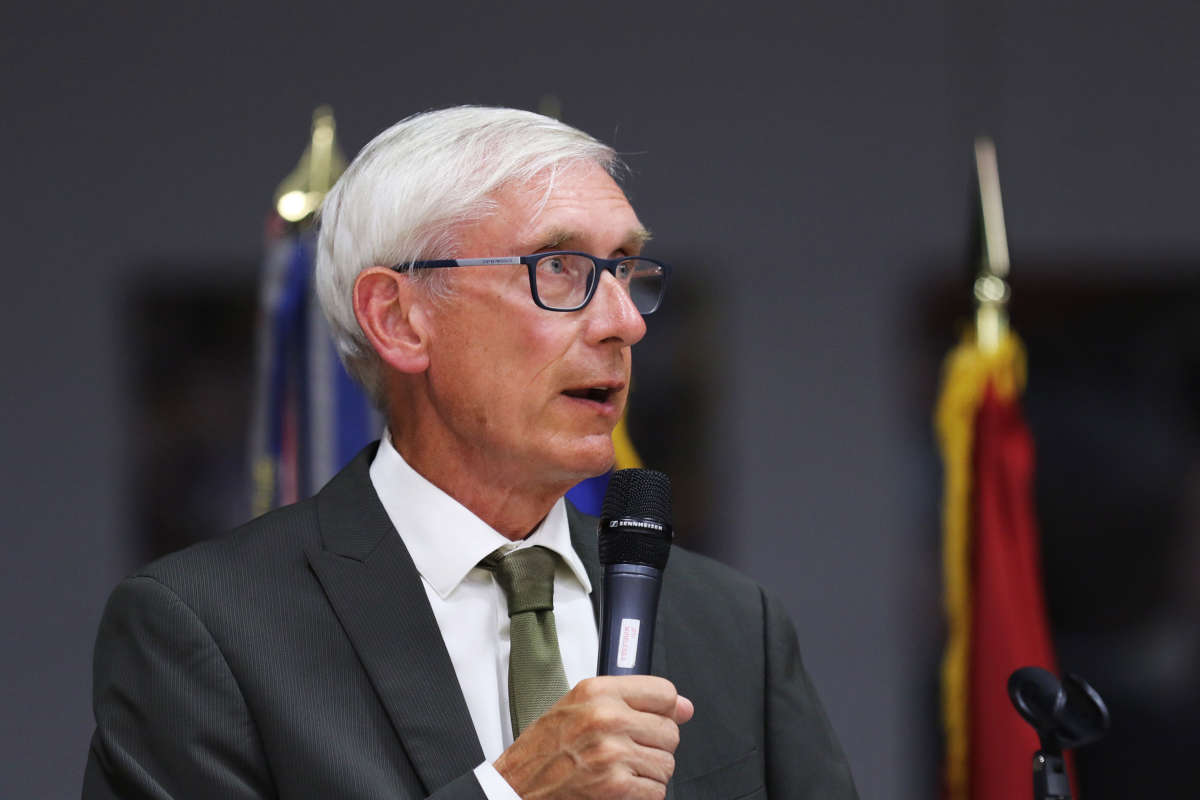A ruling from the state Supreme Court in Wisconsin on Wednesday has effectively ended Gov. Tony Evers’s stay-at-home order throughout the entire state.
The court ruled that the governor and the Department of Health Services had overstepped their bounds and had not followed a rulemaking process in issuing social distancing edicts several weeks ago to address the spread of coronavirus within the state.
The narrow decision saw four of the state’s five conservative-bloc justices deciding against the order, with the fifth conservative joining two liberal justices in dissenting.
The court’s ruling does not put into place any new rules for the state, and requires the governor to follow a strict and laborious rulemaking process. Even if the governor decides to issue new guidelines, doing so by the standards imposed by the court could take weeks, Evers said.
The Democratic governor derided the Republicans who brought forward the lawsuit in the first place, as well as the court’s decision, believing it to be errant.
“Wisconsin Republican legislators and those four Supreme Court justices decided that facts don’t matter, the statutes don’t matter,” Evers said. He further described the ruling as throwing the state into “chaos,” comparing Wisconsin’s present situation as akin to being in the “Wild West.”
Republican lawmakers had actually asked for a six-day stay of the ruling if they prevailed in order to have an easier transition and to come up with a compromise with the governor. But confusion in the court’s ruling, stemming from an oddly worded concurring opinion from Chief Justice Patience Roggensack, caused there to be no stay established.
“I would stay future actions to enforce our decision until May 20, 2020,” Roggensack wrote, not explicitly saying that a stay was part of her ruling. “However, I trust that the parties will place the interests of the people of Wisconsin first and work together in good faith to quickly establish a rule that best addresses COVID-19 and its devastating effects on Wisconsin.”
Even other conservatives on the bench were confused by Roggensack’s ruling.
“Chief Justice Roggensack needs to clarify in an opinion whether she is or is not voting for a stay of the majority’s decision…. In a court of seven, it takes four votes to form a controlling majority on an issue,” fellow conservative Justice Rebecca Bradley wrote in her concurring opinion. “Chief Justice Roggensack provides the fourth vote to form a majority denying a stay. Without her vote, there would be only three votes and the declaration of rights would not have immediate effect.”
In spite of the confusion resulting in the immediate end to social distancing provisions, Republicans who brought the lawsuit forward praised the decision. Assembly Speaker Robin Vos and Senate Majority Leader Scott Fitzgerald wrote in a joint statement that they agreed with the ruling, and suggested it wouldn’t result in a spread of COVID-19 across the state.
“This (court decision) does not promote people to act in a way that they believe endangers their health,” the two said.
Yet images online and calls to action from commerce groups seemed to suggest otherwise. The Tavern League of Wisconsin — a group that donates heavily to Republican candidates — for instance, told members that they could “open immediately” after the state Supreme Court ruling was issued on Wednesday.
Many bars across the state did just that, and images on social media showcased how social distancing rules (including keeping patrons six feet apart or encouraging the use of masks) were being ignored.
45 minutes after the bars open in Wisconsin…. pic.twitter.com/xqaDlS6ajP
— Nick's bar (@nicksonsec) May 14, 2020
The court’s ruling goes against the viewpoints of most Wisconsinites. According to a Marquette Law School poll released just this past week, nearly 7 in 10 people in the state said Evers’s decision to close schools and businesses, and to implement other social distancing rules, was the appropriate response to the pandemic. Fifty-six percent of participants in the poll also said they were more worried the state was going to open up too soon rather than reopen too slowly.
The decision to reopen the state does not limit local governments of cities, townships or counties from enforcing their own stay-at-home measures. Many took swift action Wednesday night after the ruling was rendered establishing the state’s previous guidelines for their own jurisdictions in order to ensure their residents would remain safe from the virus.
Join us in defending the truth before it’s too late
The future of independent journalism is uncertain, and the consequences of losing it are too grave to ignore. To ensure Truthout remains safe, strong, and free, we need to raise $46,000 in the next 7 days. Every dollar raised goes directly toward the costs of producing news you can trust.
Please give what you can — because by supporting us with a tax-deductible donation, you’re not just preserving a source of news, you’re helping to safeguard what’s left of our democracy.
